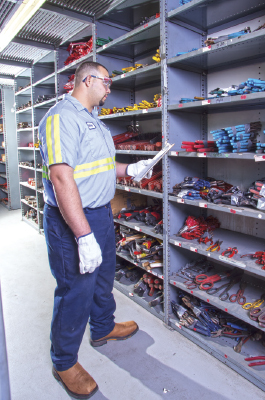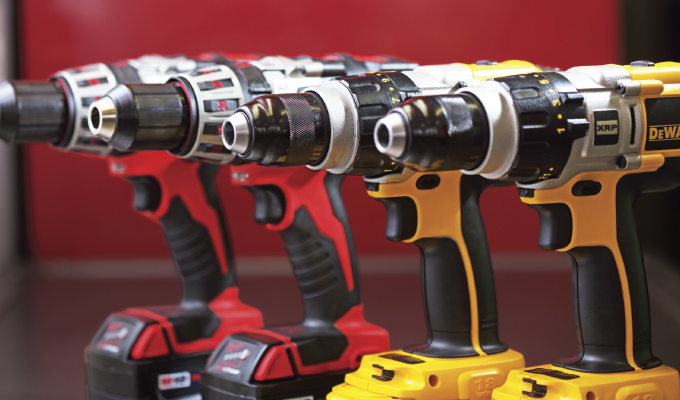By Adrian Gram
Having the right tools for a project is a game-changer, but it can seem like a necessary evil if you have to invest in tools you only need occasionally. On the other hand, if you don’t have the right tools in your tool box, or the ones you need are damaged, your project schedule could be at risk. But is investing in new tools for the crew really the way to go? Or should you rent them?
It’s important to look at the total cost of investment. Beyond the initial purchase price, many construction tools carry some hidden costs that could impact your decision to buy vs. rent. If you’re in need of some new tools, here are some things to consider:
Maintenance. Even the most basic hand tools need a regular rag cleaning. More advanced tools require some additional maintenance to keep them in good working condition, and also for safety reasons. For example, air-powered impact wrenches need to be checked for leaks, cleaned of moisture that could lead to rust, and oiled to ensure proper performance. Arc welders need oil changes and clean filters, as well as leak checks and inspections for worn hoses. That’s a lot of maintenance for just two tools in the fleet, but ignoring the essentials could shorten the lifespan, which leads to additional, and costly, replacements.

Repair and replacement. There’s no real test to know how long a tool will last, but quality can be an indicator of a longer shelf life. Read the warranty carefully—understand what it does and does not cover, and for how long. If a tool breaks and the warranty doesn’t cover the damage, the cost of repair or replacement is on you and would contribute to the overall price tag. While a repair can keep a project moving, it doesn’t change the age or fundamental condition of the tool, which could need additional repairs more frequently moving forward.
Tracking. With a large fleet, tracking owned tools can turn into a full-time job. Tools in repair, in good condition, or in use—tracking takes time and ultimately adds to the project budget. Fleet-tracking technology is often built into tool rental, which is an added advantage to the crew, the timeline, and the budget.
Storage. Storing tools requires space, which again costs money. The more tools a company owns, the more storage is needed.
Insurance. Contractors who invest in high-tech tools—for instance, a new $1,500 laser level—may find they need a tool insurance policy that covers loss or damage to protect their investments. For more expensive specialty tools, special policy floaters can be added for an additional expense.
Theft. The National Equipment Register found that construction jobsite theft costs the industry as much as $1 billion each year. Tool loss is greatest on jobsites that have no tracking, tracing, or accountability of who has a tool at any given time. The frustrating buy-lose-buy cycle can send a tool budget skyrocketing and erode profitability.
Capital preservation. Buying tools, especially expensive ones, also creates an opportunity cost. In other words, because you put the money into tools, you’ve lost the opportunity to use the capital in other ways. You can no longer decide that some of your capital would be better spent on another, more profitable investment, especially when the tool might only be utilized for a fraction of the project.
When factoring in tool purchase price, insurance, and replacement cost, management, maintenance, repair, and warehousing, the costs associated with owning tools can be 30-50 percent more than the original purchase price. It’s generally more cost-effective to rent tools rather than own them, except for basic tools you use every day.
THE RIGHT TOOLS AT THE RIGHT TIME
There are options for tool rental that span from single tools and tool packages to complete onsite mobile tool rooms, custom-stocked for craft worker and project specifications. Some jobs require a specific set of tools, and by renting, contractors ensure they’re compliant with OSHA, ANSI, and MSHA standards.
Tool and equipment rental providers should have specially-trained experts available to help determine the right tools and supplies for the job—scaled and configured to the project scope. These experts can also help bridge any gaps between estimating and project management teams, budgeting for tool costs in the planning process. Rental tool experts are a resource that should be utilized more by contractors, because they deliver a lot of value when it comes to planning and tracking inventory, conducting inspections, and providing maintenance to keep crews productive and minimize downtime.
Renting tools can also help level out inefficiencies during a project’s lifecycle. In most cases, different stages of a project require different sets of tools, and the cost of a large, scalable tool fleet adds up. Renting helps a contractor shave costs off the purchase budget because there’s no need to overstock the fleet to handle peak periods, only to let tools sit idle afterwards.
A large tool fleet is a lot to manage, so your rental provider should provide a tool management system that keeps up-to-date electronic histories for tools and materials on site. Long gone are the days of missing tools that “walked away.” By tracking tools throughout the project cycle, you gain visibility into potential issues and can act on opportunities for more productivity and cost-savings.
CONCLUSION
Having the right tool at the right time is the name of the game when it comes to productivity. Contractors who rent top-quality, well-maintained tools can streamline operations and decrease downtime through onsite availability. Renting also gives companies the flexibility to free up capital and invest in other areas of the business. It’s a viable strategy that reduces your overall tool cost and lets you add dollars to the bottom line.
About the Author
Adrian Gram is director of sales and marketing at United Rentals. United Rentals provides customized tool solutions, from a single tool rental to managed mobile tool rooms for projects of any size, complexity, and duration. For more information, visit www.unitedrentals.com.
Modern Contractor Solutions, May 2019
Did you enjoy this article?
Subscribe to the FREE Digital Edition of Modern Contractor Solutions magazine.



